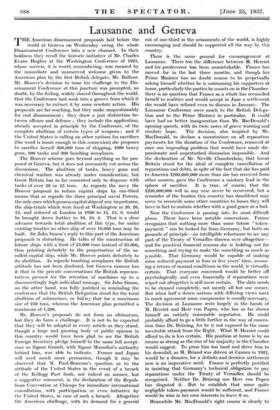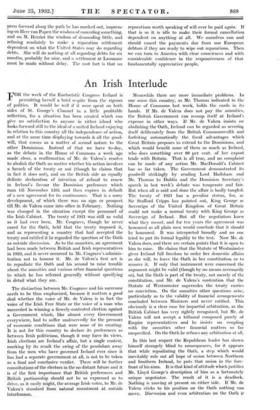Lausanne and Geneva
THE American disarmament proposals laid before the world at Geneva on Wednesday swing the whole Disarmament Conference into a new channel. In their boldness they recall the historic initiative of Mr. Charles Evans Hughes at the Washington Conference of 1921, whose success, it is worth remembering, was ensured by the immediate and unreserved welcome given to the American plan by the first British delegate,. Mr. Balfour. Mr. Hoover's decision to issue his challenge to the Dis- armament Conference at this juncture was prompted, no doubt, by the feeling, widely shared throughout the world, that the Conference had sunk into a groove from which it was necessary to extract it by some resolute action. His proposals are far-reaching, but they make unquestionably for real disarmament ; they draw a just distinction be- tween offence and defence ; they include the application, already accepted in principle by the Conference, of the complete abolition of certain types of weapons ; and if the United States is calling on other nations for sacrifices (the word is ironic enough in this connexion) she proposes to sacrifice herself 300,000 tons of shipping, 1000 heavy guns, 900 tanks and 300 bombing aeroplanes.
The Hoover scheme goes beyond anything so far pro- posed at Geneva, but it does not necessarily cut across the discussions. The abolition of tanks, heavy guns and chemical warfare was already under consideration, but Great Britain has so far consented only to dispense with tanks of over 20 or 25 tons. As regards the navy the Hoover proposal to reduce capital ships by one-third means that as regards the three principal naval Powers, the only ones which possess capital ships of any importance, the ship-totals which were fixed at Washington as 20, 20, 12, and reduced at London in 1930 to 15, 15, 9, would be brought down further to 10, 10, 6. That is a clear advance towards total abolition of this type, for under existing treaties no other ship of over 10,000 tons may be built. Sir John Simon's reply to this part of the American proposals is disturbing. He talks of the construction of future ships with a limit cf 25,000 tons instead of 05,000, thus pointing definitely to the perpetuation of the so- called capital ship, while Mr. Hoover points definitely to its abolition. As regards bombing aeroplanes the British attitude has not been disclosed, but Geneva rumour has it that in the private conversations the British represen- tatives pressed for the retention of machines up to a disconcertingly high individual tonnage. Sir John Simon, on the other hand, was fully justified in reminding the conference that the British Delegation stood for the total abolition of submarines, or faiEng that for a maximum size of 250 tons, whereas the American plan permitted a maximum of 1,200.
Mr. Hoover's proposals do not form an ultimatum, but they do form a challenge. It is not to be expected that they will be adopted in every article as they stand, though a large and growing body of public opinion in this country would have been glad to see the British Foreign Secretary pledge himself to the same full accept- ance as Signor Grandi, with Signor Mussolini's authority behind him, was able to indicate. France and Japan will need much more persuasion, though it may be 'observed that M. Paul-Boncour's question as to the attitude of the United States in the event of a breach of the Kellogg Pact finds, not indeed an answer, but 'a suggestive comment, hi the declaration of the Repub- lican Convention at Chicago for immediate international consultation, with participation or even initiative by ' the United States, in case of such a breach. Altogether the American challenge, with its demand for a geneial cut of one-third in the armaments of the world, is highly encouraging and should be supported all the way by this country.
There is the same ground for encouragement at Lausanne. There too the difference between M. Herriot and his predecessor has been unmistakable. France has moved far in the last three months, and though her Prime Minister has no doubt reason to be perpetually asking himself whether he is outrunning his supporters at home, particularly the parties he counts on in the Chamber there is no question that France as a whole has reconciled- herself to realities and would accept in June a settlement she would have refused even to discuss in January. The Lausanne Conference owes much to the British Delega- tion and to the Prime Minister in particular. It contd have had no better inauguration than Mr. MacDonald's opening speech, with its twin notes of grave warning and resolute hope. The decision, also inspired by Mr. MacDonald, to declare a moratorium on all reparation payments for the duration of the Conference, removed at once one impending problem that would have made dis- passionate and unperturbed discussion impossible. And the declaration of Mr. Neville Chamberlain, that Great Britain stood for the ideal of complete cancellation of reparations and debts, in spite of the fact that she has paid to America £200,000,000 more than she has received from other sources, gave the Conference a salutary lead in the sphere of sacrifice. It is true, of course, that the £200,000,000 will in any case never be recovered, but a reminder of the burden this country has shouldered may- serve to reconcile some other countries to losses they will have in fact to sustain whether with a good grace or a bad.
Now the Conference is passing into its most difficult phase. There have been notable concessions. France recognizes that nothing more than some future " token- payment " can be looked for from Germany, but both on grounds of principle—an intelligible reluctance to see any part of the Treaty of Versailles thrown over altogether— and for practical financial reasons she is holding out for something and trying to make the something as much as passible. That Germany would be capable of making some reduced payment in four or five years' time, assum- ing a return of normal conditions in the world, is virtually certain. That everyone concerned would be better off psychologically and even financially if reparations were wiped out altogether is still more certain. The slate needs to be cleaned completely, not merely all but one corner. But when half a dozen nations with differing views meet to reach agreement some compromise is usually necessary. The decision at Lausanne rests largely in the hands of M. Herriot and Herr von Papen, who has so far shown himself an entirely reasonable negotiator. He could probably afford to go a little further in the way of conces- sion than Dr. Bruning, for he is not exposed to the same inevitable attack from the Right. What M. Herriot could afford to do is less certain. His position at home is by no means as strong as the size of his majority in the Chamber would suggest. To press him too hard and drive him to his downfall, as M. Briand was driven at Cannes in 1922, would be a disaster, for a definite and decisive settlement now is an imperative need. France is perfectly justified in insisting that Germany's technical obligation to pay reparations under the Treaty Of Versailles should be recognized. Neither Dr. Bruning nor Herr von Papen has disputed it. But to establish that some quite negligible token-payment would be sufficient, and France would be wise in her own interests to leave it so.
Meanwhile Mr. MacDonald's right course is clearly to press forward along the path be has marked out, impress- ing on Herr von Papen the wisdom of conceding something, and on M. Herriot the wisdom of demanding little, and refusing resolutely to make a reparation settlement dependent on what the United States may do regarding debts. She will do nothing at all regarding debts for six months, probably for nine, and a settlement at Lausanne must be made without delay. The root fact is that no
reparations worth speaking of will ever be paid again. If that is so it is idle to make their formal cancellation dependent on anything at all. We ourselves can and should cancel the payments due from our European debtors if they are ready to wipe out reparations. Then we can turn to America with clear consciences and with considerable confidence in the responsiveness of that fundamentally appreciative people.



































 Previous page
Previous page